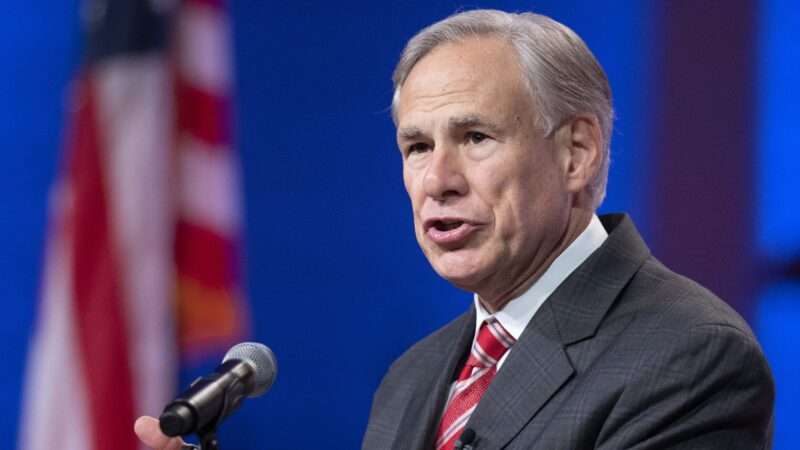

Earlier today, Texas Gov. Greg Abbott ended a system of onerous inspections he had previously imposed on trucks crossing into his state from Mexico. The official rationale for the inspections was the supposed need to curb cross-border drug smuggling and illegal migration. But, as Reason's Fiona Harrigan explains, the inspections caused great harm for little, if any gain:
The enhanced inspections, which bolster efforts already carried out by Customs and Border Patrol (CBP), have brought traffic to a standstill in the name of stopping the illegal transportation of drugs and migrants. "We weren't taken into consideration," said Ernesto Gaytan, chair of the Texas Trucking Association (TXTA), telling Reuters that migrants rarely attempt to enter the U.S. on commercial trucks at ports of entry….
"Unfortunately, this new initiative duplicates existing screening efforts and leads to significant congestion, delaying the products Americans rely on from our largest trading partner, Mexico," reads a statement from the TXTA. Mexico's National Chamber of Freight Transport reported that its member companies were losing millions of dollars each day due to delays. The Texas International Produce Association implored Abbott to modify his policy, with CEO Dante Galeazzi writing that "U.S. trucking companies are losing money as they sit around for days with no loads to haul." Galeazzi reported hearing "that a trucking company is refusing to send trucks south of San Antonio out of concern there will be no cargo available." Perishable goods run the risk of spoiling during long waits in the Texas heat.
Far from being a localized issue, the delays imposed by Abbott's new inspection measures have also irked federal border officials, who warn about broader supply chain challenges. CBP described recent wait times "exceeding five hours and commercial traffic dropping by as much as 60 percent," noting that its officials already "comprehensively" inspect and clear vehicles to enter the U.S. "The strength of the American economy relies heavily on the efficient flow of cross-border commerce," said CBP.
After an outcry by truckers and others, Abbott terminated the inspections. He has tried to claim victory by citing agreements reached with the governors of Mexican border states. But, in fact, as the Texas Tribune has documented, the agreements don't include any significant provisions beyond what the Mexicans were already doing:
Abbott said the deals with Chihuahua, Coahuila, Nuevo León and Tamaulipas were "historic," calling them an example of how border states can work together on immigration. But three of the four Mexican governors said they will simply continue security measures they put in place before Abbott ordered the state inspections.
The fourth, Nuevo León Gov. Samuel Alejandro García Sepúlveda — whose state shares only 9 miles of the 1,200-mile Texas-Mexico border — agreed to set up new checkpoints for commercial trucks.
This strongly suggests that the inspections were more about grandstanding for the benefit of Abbott's political base, than solving any genuine problem.
In addition, it is likely that they were also unconstitutional. The Dormant Commerce Clause of the Constitution restricts state regulations that impede interstate and foreign commerce. Most of the relevant legal precedents are about state laws that burden interstate commerce. But Supreme Court precedent makes clear that similar constraints apply to state regulation of international trade, which thereby infringes the "Dormant Foreign Commerce Clause."
The legal doctrine here is complicated, and I am by no means expert on all of it. But I would tentatively say that Abbott's inspection regime was a fairly obvious violation of the Dormant Foreign Commerce Clause. Supreme Court precedent is especially clear that the Dormant Commerce Clause forbids state regulations that target international or interstate commerce or discriminate against it. The Abbott inspections focused exclusively on cross-border trade, and were explicitly intended to target it. No similarly onerous inspections were imposed on purely domestic trucking.
I welcome correction by Dormant Commerce Clause experts. But if I have this right, it looks like an easy case. The issue may be moot, as the inspections have ended. However, it could arise again if Abbott or another border-state governor decides to institute a similar policy in the future. It is also possible that truckers and others harmed by Abbott's policies could sue for damages. The Supreme Court has ruled that Dormant Commerce Clause violations can sometimes give rise to damages lawsuits under 42 U.S.C. Section 1983.
Some conservative jurists, such as Supreme Court Justices Clarence Thomas and the late Antonin Scalia, have argued that the Dormant Commerce Clause doctrine lacks originalist support and should be abolished. If so, the neither Abbott's policy nor anything else could violate it. I won't try to assess the merits of this longstanding debate here, except to note that adopting Scalia Thomas' position would require reversal of longstanding Supreme Court precedent.
The post Texas Gov. Greg Abbott Ends His Onerous Truck Inspection Order Impeding International Commerce on the Mexican Border appeared first on Reason.com.







